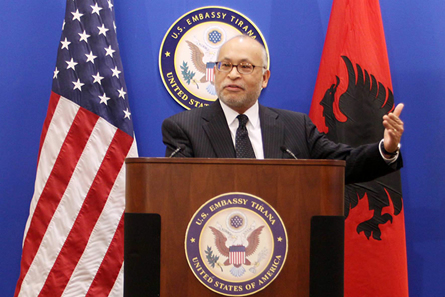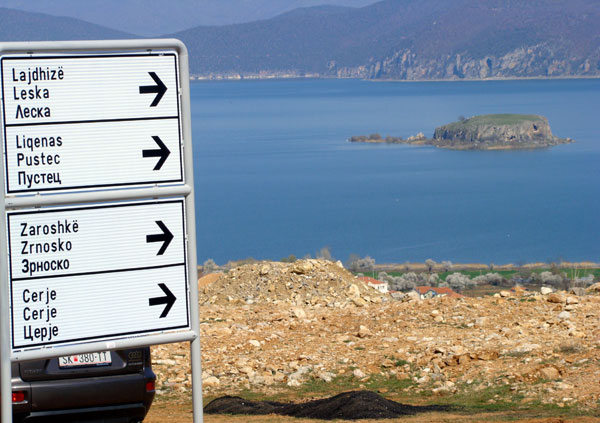
The US Ambassador condemned the recent intimidation of ethnic Macedonian minorities in Liqenas (Pustec) by some misguided individuals, saying that such behaviour is completely unacceptable and should be rejected categorically by all Albanians.
The US Ambassador also said: “The United States of America does not support the redrawing of national borders in the Balkan region and any efforts to that effect are counterproductive and destabilizing. Albania’s political parties and leaders should focus on what they claim is important: Euro-Atlantic integration”, said US Ambassador Alexander Arvizu in Tirana, 14 december 2012, at the 15th International Conference on Security in the Western Balkans.
“Talk of an illusory ‘Greater Albania’ is a distraction from the very real problems that Albania faces today, and the voters shouldn’t fall for it,” he said.
Recently the United States has observed an unfortunate rise in nationalist rhetoric here in Albania, especially in the weeks leading up to and following the 100th anniversary celebrations, the Ambassador said.
“This retoric contrasts sharply with the overall constructive role that Albania has traditionally played in the region, notably with ethnic-Albanian populations. The Government of the Republic of Albania and political parties – this includes the opposition – have typically issued clear, responsible messages encouraging ethnic-Albanian populations residing outside the country to work with their governments to resolve their issues,” he said.

Recently, the US Ambassador said, various political actors in Albania have sought to use negative messages centered on ethnicity for their narrow political ends. This is a dangerous game. Ethnic tensions, once aroused, are difficult, if not impossible to predict or control. It is imperative that responsible individuals refrain from inflaming ethnic sentiment, whether inside or outside Albania.
In addition to potentially destabilizing the region, nationalistic rhetoric and actions damage Albania’s reputation. Because of various controversial statements and assertions made in the lead-up to the 100th anniversary celebrations, two neighboring countries (Macedonia and Greece) canceled their participation in this historic event.
“This may seem like a minor consequence, a footnote to some, but it sets back relations, hinders communication and cooperation, and makes resolving other outstanding issues that much more difficult. And we, the United States, take note of it,” Arvizu said.
He fiercely condemned the recent call by the Red and Black Alliance for an Albanian-Kosovo unification referendum.
“It serves neither the country’s Euro-Atlantic integration aspirations, and undermines the progress achieved in regional stability and peace, and movement towards European integration,” he added. (Makedonium)

Si qytetar i thjeshte nuk kam degjuar reagimin e strukturave te shtetit per aktin vandal qe eshte kryer ne kete zone.Policia e Korces nuk eshte prononcuar dhe as qe ka ndaluar ndonje huligan shqiptar per “trimerite”qe ka treguar ne Prespe.
I ftoj keta “trimosha” bashke me krietarin e tyre te shkojne ne Dropull ose Himare, se me siguri do i rezervojne pritje te mire.